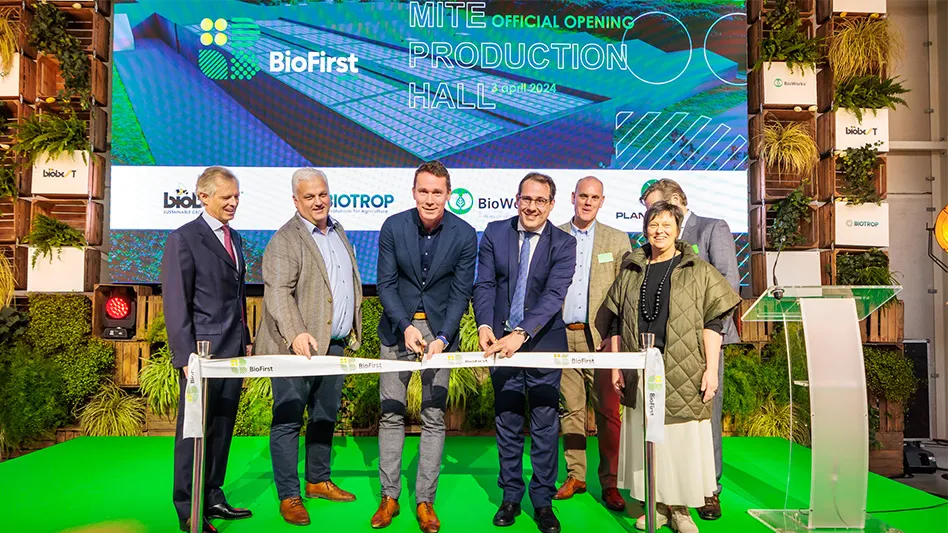Biobest Group rebranded as BioFirst Group, opens new predatory mite production facility
Apr. 5, 2024
Follow
Biobest Group has changed its name to BioFirst Group, revealing the news, along with the global sustainable crop production company's new structure and logo, at the opening of its new cutting-edge, predatory mite production facility in Westerlo, Belgium.
In attendance were David Clarinval, Deputy Prime Minister and Minister for the Self-Employed, SMEs and Agriculture, Institutional Reforms and Democratic Renewal, and Jo Brouns, Flemish Minister of Economy, Innovation, Work, Social Economy and Agriculture.

Established in Belgium more than 37 years ago, today the group employs more than 2,800 people worldwide, working with growers and farmers in more than 70 countries.
A key component of its growing portfolio of biological crop protection and crop health products, predatory mites are deployed by growers worldwide to control economically important pests and play a central role in the ecologically sound production of high-yielding healthy crops. These tiny natural predators help to minimize chemical pesticide usage and satisfy societal demands for healthier, residue-free crops.
″Our 12m EUR investment in this new state-of-the-art, 4000sqm mite-rearing facility will greatly boost our production capabilities and house up to 50 employees,″ said CEO Jean-Marc Vandoorne. ″Thanks to our highly skilled teams and our pioneering mass-rearing techniques for mites, this new facility stands at the forefront of biocontrol innovation. It enables us to scale up production to enhance our ability to fulfil customer demands.″
Utilizing the latest technologies and innovations, the new production facility is run entirely on green energy and is fossil fuel-free. It features a heat pump system, air handling units, a high-end heat exchanger to maximize energy recovery and a solar PV-installation generating 416,000 kWh per year — equivalent to a reduction of CO2 emissions for the entire Westerlo site by 15%, or 44 tons.
″With sustainability at the heart of everything we do, these energy efficiency gains are part of the innovative approaches we are taking to minimize the Group’s carbon footprint,″ Vandoorne said.
Reflecting on the current legislative landscape, Vandoorne said, ″While delighted to unveil our new state-of-the-art predatory mite production facility today, we continue to urge EU policymakers to shorten the lengthy registration processes for biopesticides where we are currently putting our European growers and farmers at a serious disadvantage in accessing solutions to counter increasing pest resistance to conventional pesticides. Registration of biopesticides currently takes between six to 10 years in Europe, while everywhere else in the world it takes only one to three years.″
Brouns added: ″In a time when Europe is being challenged on the very foundations of its cooperation, it is our responsibility to create the strategic autonomy that is needed to feed the next generations of European citizens. If we want to do that in a more sustainable way, which we should, then we must also give our farming sector the chance to develop and use the alternatives that are needed.″

At the official opening, Biobest Group also unveiled its new company structure, group name and logo.
″Following our recent acquisition of Biotrop — the Brazilian leader in biopesticides, biostimulants and inoculants for open-field row crops — Biobest Group has reorganized its structure to improve its operational efficiencies and agility,″ Vandoorne said. ″Rebranded as BioFirst Group, we now have a structure focusing on the horticulture market and a structure focusing on the open field market.″
In the horticulture market, Biobest and its worldwide subsidiaries will continue to focus on the development, production and sales of beneficial insects, mites and nematodes to control plant pests in greenhouse crops. BioWorks will focus on the development, production and sales of biopesticides in horticulture crops, and Plant Products will comprise a number of one-stop-shop distributors in the horticulture market.
In the open field market, Biotrop will focus on the development, production and sales of biopesticides, biostimulants and inoculants in open-field crops worldwide.
The BioFirst name captures the group’s dedication to biological solutions and innovation as well as its customer-first mindset. The new logo depicts environmentally friendly, healthy crops in fields and greenhouses using a nature-inspired color palette
″Belgium has always been fertile ground for innovative, pioneering companies like BioFirst. With its biopesticides as an alternative to conventional pesticides, this company offers solutions for competitive, sustainable and high-quality Belgian and European agriculture," Clarinval said. "Our farmers need effective plant protection products to ensure sufficient food production and high yields. BioFirst therefore contributes to improving our farmers' incomes, while preserving our ecosystem, and I'm delighted about that."
″With our added production capabilities and new organizational structure under the BioFirst Group umbrella, we are in good shape to achieve our ambitious goal to enter the top 10 of global crop protection companies as a pure player in biological solutions in the next 10 years," Vandoorne said.
BioFirst has 32 local production and/or distribution subsidiaries located worldwide, plus an extensive network of local specialized distributors located in an additional 50 countries. A global player in biological pest and disease control and bumblebee pollination of high value greenhouse and berry crops, BioFirst exports weekly to more than 70 countries worldwide.
Its product portfolio features a comprehensive range of IPM solutions, including beneficial insects, predatory mites, bumblebees, insect pathogenic nematodes, biopesticides, biostimulants, biofertilizers and inoculants as well as monitoring, scouting, high-tech IPM tools and pheromone products.
More from AgroNews Change
Change
Subscribe
| Subscribe Email: | * | |
| Name: | ||
| Mobile Number: | ||
Comment
0/1200

 0
0 Subscribe
Subscribe




 Belgium
Belgium










